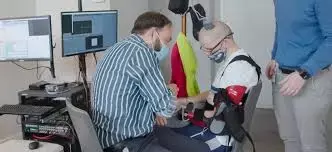- Home
- Medical news & Guidelines
- Anesthesiology
- Cardiology and CTVS
- Critical Care
- Dentistry
- Dermatology
- Diabetes and Endocrinology
- ENT
- Gastroenterology
- Medicine
- Nephrology
- Neurology
- Obstretics-Gynaecology
- Oncology
- Ophthalmology
- Orthopaedics
- Pediatrics-Neonatology
- Psychiatry
- Pulmonology
- Radiology
- Surgery
- Urology
- Laboratory Medicine
- Diet
- Nursing
- Paramedical
- Physiotherapy
- Health news
- Fact Check
- Bone Health Fact Check
- Brain Health Fact Check
- Cancer Related Fact Check
- Child Care Fact Check
- Dental and oral health fact check
- Diabetes and metabolic health fact check
- Diet and Nutrition Fact Check
- Eye and ENT Care Fact Check
- Fitness fact check
- Gut health fact check
- Heart health fact check
- Kidney health fact check
- Medical education fact check
- Men's health fact check
- Respiratory fact check
- Skin and hair care fact check
- Vaccine and Immunization fact check
- Women's health fact check
- AYUSH
- State News
- Andaman and Nicobar Islands
- Andhra Pradesh
- Arunachal Pradesh
- Assam
- Bihar
- Chandigarh
- Chattisgarh
- Dadra and Nagar Haveli
- Daman and Diu
- Delhi
- Goa
- Gujarat
- Haryana
- Himachal Pradesh
- Jammu & Kashmir
- Jharkhand
- Karnataka
- Kerala
- Ladakh
- Lakshadweep
- Madhya Pradesh
- Maharashtra
- Manipur
- Meghalaya
- Mizoram
- Nagaland
- Odisha
- Puducherry
- Punjab
- Rajasthan
- Sikkim
- Tamil Nadu
- Telangana
- Tripura
- Uttar Pradesh
- Uttrakhand
- West Bengal
- Medical Education
- Industry
A New Hope For Mobility After Stroke - Cortimo Trial's Enticing Findings

Jefferson researchers at the Vickie and Jack Farber Institute for Neuroscience have initiated Cortimo trial (patent pending), using microelectrodes in the brain and a robotically-powered brace to test a method that could one day restore movement in parts of the body impaired by stroke and offer patients with long-term disability new hope for better mobility & restored function.
Many patients suffer long term disabilities from stroke and struggle with activities of daily living and simple tasks such as drinking a cup of coffee or zippering a jacket. The Cortimo trial (patent pending) and future studies to help restore function bring new hope for stroke recovery. This could be a game-changer in rehabilitation options for stroke patients.
Cortimo trial was a proof of concept study that acts as a necessary bridge for additional studies that will pave the way for a future in which a patient with a permanent disability from a stroke can regain function. This implantation procedure was previously done by Dr Serruya, 15 years ago, who was also part of the present team (principle investigator). Recently, Jefferson Health performed this procedure on their first patient who had suffered a stroke, two years ago. Researchers microelectrodes into the brain that then decodes signals to drive motor function on the powered arm brace allowing the patient to "power steer" his or her own arm. The team has been working for the past three months to train his control of the brain-implant in order to drive movement of the robotic brace that was fitted for his impaired arm.
The principle investigator Dr Mijail D. Serruya, MD, PhD, an assistant professor of neurology at Thomas Jefferson University in Philadelphia, reported in an interview, "The risk-benefit may be acceptable for someone who has quadriplegia because of, for example, spinal cord injury or end-stage ALS who may already have a tracheostomy and a percutaneous endoscopic gastrostomy. But for someone who is hemiparetic and ambulatory, that may not be acceptable. And a fully implantable system would also have much better patient compliance."
However, he also said that contraindication would eventually be solved with the advancement in science and engineering over a while.
He concluded, "Now we can point to the fact that 2 years after stroke, all of these brain areas are still active, and devices that can potentially reverse and unparalyze your limbs may be available in the coming 5- or 10-plus years." and further added, "I don't want to cause unreasonable hope that we're going to snap our fingers and it's going to be cured. But I do think it's fair to raise a possibility as a way to say that keeping oneself really healthy is justified."
For further information:
Medical Dialogues Bureau consists of a team of passionate medical/scientific writers, led by doctors and healthcare researchers. Our team efforts to bring you updated and timely news about the important happenings of the medical and healthcare sector. Our editorial team can be reached at editorial@medicaldialogues.in.
Dr Kamal Kant Kohli-MBBS, DTCD- a chest specialist with more than 30 years of practice and a flair for writing clinical articles, Dr Kamal Kant Kohli joined Medical Dialogues as a Chief Editor of Medical News. Besides writing articles, as an editor, he proofreads and verifies all the medical content published on Medical Dialogues including those coming from journals, studies,medical conferences,guidelines etc. Email: drkohli@medicaldialogues.in. Contact no. 011-43720751


